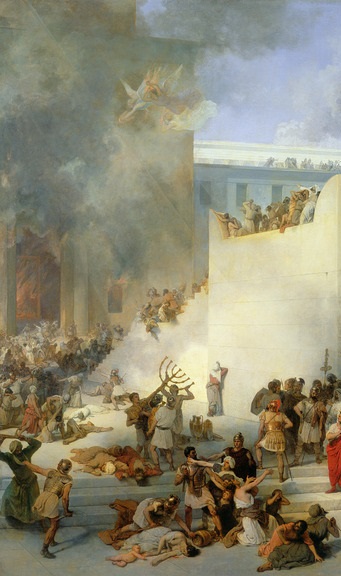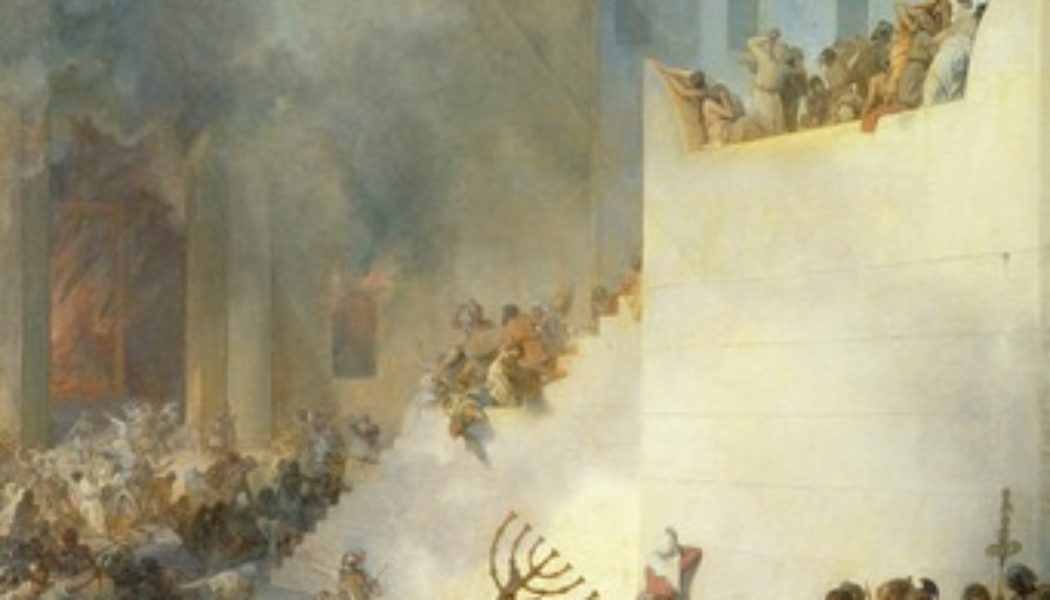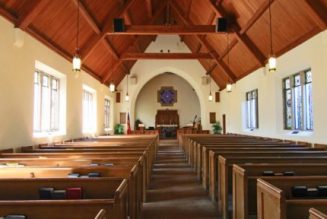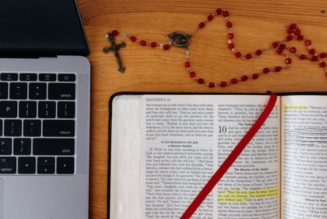Today I will be speaking to you about why the Jewish calendar is different from our own, about why this Sunday is of special significance in Jewish history, and about the enduring faithfulness of our Lord towards his people.
Like many ancient cultures, the Jews kept a lunar calendar, while we, and most of the world today, follow a particular solar calendar. Our modern calendar is called the Gregorian Calendar, instituted by Pope Gregory XII in 1582. For the Gregorian Calendar, one orbit around the Sun makes one year, counted as 365 days (or 366 days in a leap year). The Jewish calendar, instead, is focused on the Moon: one cycle of the Moon through its phases makes one month, counted as 29 or 30 days. Because the cycles of the Sun and Moon do not perfectly match-up, particular dates on solar and lunar calendars do not line-up either. This means the dates of Jewish holidays and observances float around on the Gregorian calendar. Today, for instance, is the ninth day of the Jewish month of Av. The ninth of Av falls on July 18th this year, but next year it will land on August 6th.
 The “ninth of Av,” also known as Tisha B’Av, is no ordinary day for observant Jews, but a day of fasting and abstaining, because ninth of Av has seen multiple calamities in Jewish history. First, during the Exodus, when the twelve spies sent by Moses returned from scouting the Land of Canaan, most of them voiced negative reports, saying there was no way The Promised Land could be conquered. The Hebrews despaired and cried and refused to proceed. As a consequence, God made his people spend 40 more years in the desert until almost all the adults of that generation had died without entering The Promised Land. The next calamity came in the days of the Prophet Jeremiah, after the founding of the Kingdom of Israel. In the sixth century B.C., the Jewish Temple built by King Solomon in Jerusalem was destroyed by the conquering Babylonians. With that disaster, the Jews were forced to leave their homeland and resettle in the East, and this Babylonian Exile lasted about seventy years until a significant number of Jews were able to return. A third catastrophe occurred in 70 A.D., when the Second Temple in Jerusalem was destroyed by the Romans in response to a Jewish revolt. Not one stone was left upon another, as Jesus had foretold about 40 years before it came to pass. All of these devastating catastrophes, all three of these traumatic, mournful events (the denial of The Promised Land and the destruction of the first and second Temples) are remembered as occurring over the ninth day of Av.
The “ninth of Av,” also known as Tisha B’Av, is no ordinary day for observant Jews, but a day of fasting and abstaining, because ninth of Av has seen multiple calamities in Jewish history. First, during the Exodus, when the twelve spies sent by Moses returned from scouting the Land of Canaan, most of them voiced negative reports, saying there was no way The Promised Land could be conquered. The Hebrews despaired and cried and refused to proceed. As a consequence, God made his people spend 40 more years in the desert until almost all the adults of that generation had died without entering The Promised Land. The next calamity came in the days of the Prophet Jeremiah, after the founding of the Kingdom of Israel. In the sixth century B.C., the Jewish Temple built by King Solomon in Jerusalem was destroyed by the conquering Babylonians. With that disaster, the Jews were forced to leave their homeland and resettle in the East, and this Babylonian Exile lasted about seventy years until a significant number of Jews were able to return. A third catastrophe occurred in 70 A.D., when the Second Temple in Jerusalem was destroyed by the Romans in response to a Jewish revolt. Not one stone was left upon another, as Jesus had foretold about 40 years before it came to pass. All of these devastating catastrophes, all three of these traumatic, mournful events (the denial of The Promised Land and the destruction of the first and second Temples) are remembered as occurring over the ninth day of Av.
Each of these disasters flowed from the faithlessness or unfaithfulness of God’s people. All of the Hebrews in the Exodus had witnessed the Lord’s mighty power wielded against Egypt, yet they disbelieved that God would be with them and would enable them to enter the land he had promised to Abraham’s descendants. The Prophet Jeremiah in our first reading decries the shepherds of his day (that is, the leaders of the people) whose wickedness would lead to the fall of the nation and the scattering of the sheep. And before his Passion, Jesus once lamented: “Jerusalem, Jerusalem, you who kill the prophets and stone those sent to you, how many times I yearned to gather your children together, as a hen gathers her young under her wings, but you were unwilling! Behold, your house will be abandoned, desolate.” Jesus foresaw how that generation’s rejection of their Messiah would be followed by disaster.
Yet, in the face of this faithlessness and unfaithfulness among God’s people, God remained faithful to them. The first generation of Hebrews who had left Egypt were too afraid to enter the Promised Land, but God did not void his covenant with them. While denouncing the bad shepherds who led to the Babylonian Exile, God promises to gather his scattered flock again. And even as Jesus Christ was foretelling doom for Jerusalem from rejecting the Messiah, he spoke of his own people’s conversion to faith in him one day: “I tell you, you will not see me again until you say, ‘Blessed is he who comes in the name of the Lord.’”
So what does all of this mean for you and me and the Church, the people of God’s New Covenant? Can calamities come to us? Yes – through our own unfaithful foolishness, or through the sins of others impacting our world; grave wrongs, tragic losses, painful sufferings, death. But when these calamities come, will the Lord still be with us? Yes. Through the Prophet Jeremiah he promised: “I myself will gather the remnant of my flock from all the lands.” In today’s Gospel, “When [Jesus] disembarked and saw the vast crowd, his heart was moved with pity for them, for they were like sheep without a shepherd; and he began to teach them many things.” Jesus declares, “I am the good shepherd, and I know mine and mine know me.” The Lord is our shepherd. He refreshes our souls. He guides us in right paths. Even when we walk through the dark valleys we need not fear evils, for he is at our side.
Last Sunday, a young woman named Sarah who graduated college five years ago, posted a beautiful tweet on Twitter that has been liked nearly 2,000 times. She wrote: “I looked at the crucifix at Mass today and saw love rather than death for the first time in my whole [dang] life.” Behold the Lamb of God, who takes away the sins of the world through the Cross. The Good Shepherd knows firsthand what it’s like to be a sheep like us. Jesus reassures us that he is with us and we need not be afraid. For whatever day of calamity may come, it is not the end of our story; the friends of God will rise again in glory.
Join Our Telegram Group : Salvation & Prosperity








